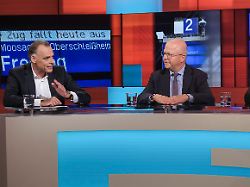Bahn-Talk at “Hard but fair”
“Extremely dissatisfied with the punctuality”
By Marko Schlichting
09/05/2023 02:24 am
listen to the article
This audio version was artificially generated. More Info | send feedback
Deutsche Bahn wants to become more customer-friendly, and above all more punctual. The railway network is to be modernized for this purpose. The guests on the ARD talk show “Hart aber fair” are concerned with how this should happen and why it got into this bad condition.
Train travelers know the problem: Trains are often not punctual or are canceled altogether. After all, 90 percent of all trains arrive on time in local traffic, but only 69 percent in long-distance traffic. Trains are on time when they are less than six minutes late. Deutsche Bahn has agreed on this guideline value because passengers can usually still catch their connecting trains if they are less than six minutes late, explains Berthold Huber, the CEO of Deutsche Bahn who is responsible for infrastructure, on the ARD talk show “Hart aber fair”. on Monday evening. The main reason for the unpunctuality of the trains is the dilapidated infrastructure on which Deutsche Bahn depends. “I’m extremely dissatisfied with the punctuality of the train,” emphasizes Huber.
“The infrastructure is very important for whether we succeed in improving the quality of the railway so that everyone can use it in the future,” said the Deutsche Bahn board member. Michael Theurer is also familiar with the problem. The FDP politician is Parliamentary State Secretary in the Federal Ministry of Transport, where he is responsible, among other things, for Deutsche Bahn. “When I take the train, I think about whether I have transfer connections. If I have to change trains twice or more, I start planning reserve times,” he says. He either takes an earlier train – or he prefers to drive straight away.
Berthold Huber is clear: “If we want to solve the problem, we have to tackle the infrastructure problems.” Christian Böttger, a professor of transport at the University of Applied Sciences in Berlin, explains the reason for these problems: “For twenty years, too little attention has been paid to the infrastructure.” It all started during the red-green government under Chancellor Gerhard Schröder. They have more than halved the budget for the railway, says Böttger. Only the current federal government is now beginning to increase the budget again. But according to Böttger, financing is not the only problem: “In addition, the network is overloaded. Twenty percent more trains are running today than twenty years ago. But the network has remained the same. There are simply too many trains running. It works at the expense of quality.”
Structural reform at the railways
In order to make Deutsche Bahn more customer-friendly again, Deutsche Bahn and the federal government have agreed on a structural program. This includes the fact that the railways are planning to have even more passengers in the future. Huber: “We want to transport twice as many passengers and increase the market share in freight transport from 17 to 25 percent.”
For this purpose, the railway would like to introduce the so-called Germany clock. That will take a long time: According to Michael Theurer, it could be the end of the 2040s. The Deutschlandtakt provides a connection between all important cities every 30 minutes. In addition, the rail connections are to be expanded in such a way that travel times are reduced. For example, Deutsche Bahn wants to drive a good hour less on the Stuttgart-Berlin route: the journey time is to be reduced from five hours and 38 minutes to four hours and 34 minutes. For the trip from Lübeck to Berlin, passengers should only have to plan a good two hours. Freight traffic should also benefit from the reduced journey times. Huber: “To do this, we have to get the infrastructure in the condition that we need. And we’re starting with that now.”
“It hurts a lot”
To be more precise: next summer. Then the railway line between Frankfurt am Main and Mannheim is to be completely closed and completely renovated for five months – from the rails to the stations. Around 300 trains run on the route every day. During this time, customers must expect train diversions or switch to rail replacement services. Other railway lines are to follow. “It hurts a lot, and you will also lose customers,” says railroad expert Böttger. But there is probably no alternative.” In fact, the route could have been renovated without closing it. But then, according to State Secretary Theurer, the work would have taken up to ten years.
Deutsche Bahn needs more money for the conversion – almost 90 billion euros by 2027, say the company and the federal government. Not even half, around 43 billion euros, are earmarked for in the federal budget. Deutsche Bahn wants to add another 27 billion, says Huber. The federal government wants to loosen up the rest with a “further financing component”. “We’ve never been that far,” Huber rejoices.
At least the plans of the federal government and Deutsche Bahn sound very ambitious. If they were actually implemented, the train would have the chance to lose its bad reputation and become a stress-free alternative to the car.
